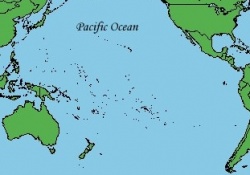Trans-Pacific Passage - West to East
From CruisersWiki
Delatbabel (Talk | contribs) (→Departure Points) |
Delatbabel (Talk | contribs) (→Passage - Australia to the Americas) |
||
| Line 35: | Line 35: | ||
===Charts=== | ===Charts=== | ||
| - | + | ||
| - | + | Charts will be the same as for the [[East to West Passage|Passage_12]] but read them backwards. :) | |
| - | + | ||
| - | + | ||
===Weather Windows=== | ===Weather Windows=== | ||
| - | + | ||
| + | It is universally accepted that there is no good weather window for doing this passage. If you are leaving Australia and heading east across the Pacific then you may as well leave in the southern hemisphere winter when the prevailing winds up the Australian east coast will be southerly and the [[EAC]] (south running current) is at its weakest. This will enable you to get some good northing into your passage before bashing endlessly into the trade winds. | ||
===Climate & Weather Information=== | ===Climate & Weather Information=== | ||
| - | + | ||
| + | Climate and weather conditions will be the same as for the [[East to West Passage|Passage_12]]. | ||
===Radio Nets=== | ===Radio Nets=== | ||
Revision as of 03:47, 23 February 2009
Contents |
Passage - Australia to the Americas
| Trans-Pacific West to East | |
| The Pacific is the largest of the oceans of the world. |
This section describes the passage across the Pacific Ocean - West to East.
Departure Points
Possible departures from:
Route
(in sequence)
- Brisbane
- Panama
Charts
Charts will be the same as for the Passage_12 but read them backwards. :)
Weather Windows
It is universally accepted that there is no good weather window for doing this passage. If you are leaving Australia and heading east across the Pacific then you may as well leave in the southern hemisphere winter when the prevailing winds up the Australian east coast will be southerly and the EAC (south running current) is at its weakest. This will enable you to get some good northing into your passage before bashing endlessly into the trade winds.
Climate & Weather Information
Climate and weather conditions will be the same as for the Passage_12.
Radio Nets
List radio Nets covering the Pacific.
References
Books, guides, etc.
CruiserLog Forum discussions
Note that there was quite a bit of discussion on the forum on this topic: http://www.cruiserlog.com/forums/index.php?showtopic=11459 The general opinion is summed up in this fragment from JeanneP:
We have friends who left NZ to sail back to the East coast of the US, and their first leg was from NZ to Panama, nonstop and took 54 days, uncomfortable for most of it.
If you can get the Discovery Channel, and have watched "Deadliest Catch" you will have some idea of what sailing in the Southern Ocean is like. And if you don't go far enough south to find westerlies, you're trying to sail directly into the wind, a hard and exhausting way to sail. The South Pacific is big and you go for long distances between land.
It's not a nationality bias, you find most sailors, from wherever, following the the trade winds East to West and enjoying the ride. And yes, you find lots of boats that have crossed the Pacific put up for sale in New Caledonia, Australia, and New Zealand. There are lots of other places that have good old boats for sale, many in the US.
External Links
Links to relevant websites.
Personal Experiences
Personal experiences of this passage.
